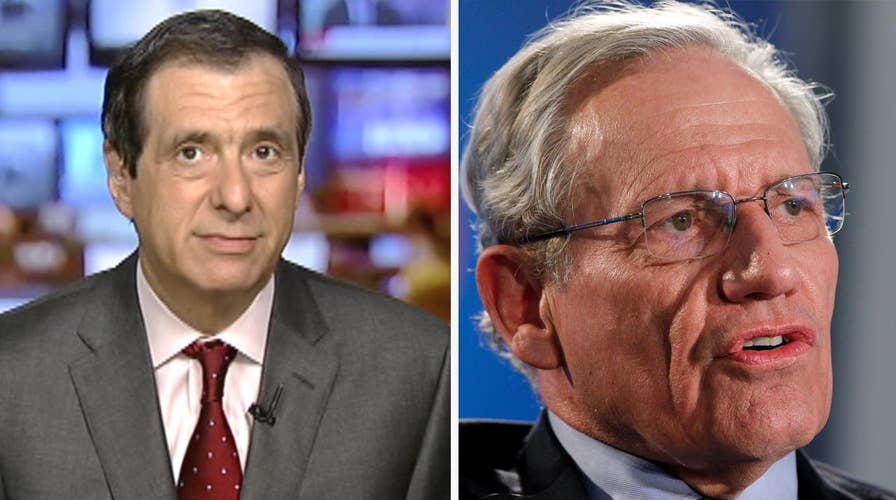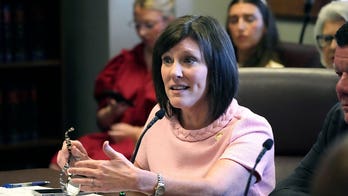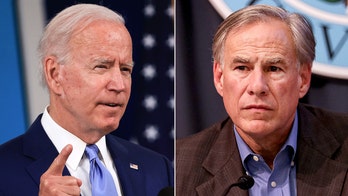Kurtz: How Bob Woodward penetrates every administration
'MediaBuzz' host Howard Kurtz weighs in on claims that Bob Woodward is a 'Dem operative' and out to hurt President Trump in his new book 'Fear.'
President Trump and his White House allies are mounting a counterattack on the Bob Woodward book, but let’s just say he's no Omarosa.
As a Pulitzer Prize-winning journalist who has been writing books about presidents since Richard Nixon, he can't simply be dismissed as a third-rate hack or someone with an ax to grind. Woodward has hundreds of hours of taped interviews with White House and other sources for "Fear," along with internal documents.
But the president is trying nonetheless, telling the Daily Caller: "It's just another bad book. He’s had a lot of credibility problems." Yesterday he told reporters "the book means nothing, it's a work of fiction ... He had the same problem with other presidents."
Senior officials have rushed out denials of disparaging comments attributed to them. And Trump tweeted:
"The Woodward book has already been refuted and discredited by General [Secretary of Defense] James Mattis and General [Chief of Staff] John Kelly," he wrote on Twitter. "Their quotes were made up frauds, a con on the public. Likewise other stories and quotes. Woodward is a Dem operative? Notice timing?"
Sorry, dismissing Bob Woodward as a possible Democratic operative simply doesn't wash. He did a tough book on the Clinton White House and a revealing look at the Obama White House handling of military conflicts.
Another tweet – "Don't know why Washington politicians don't change libel laws?" — reflects the president's larger frustration with the press. Under Supreme Court precedent, a public figure must prove that a journalist's work is not only false but that he acted with malice or reckless disregard for whether or not it was true. How exactly would the president change that?
Woodward isn't perfect. His books are always controversial. There has long been criticism that people who cooperate with him are portrayed more sympathetically than people who don't (though that is an issue for all journalists). And some of his anecdotes are frequently denied.
To wit: You have John Kelly, describing the president as "off the rails" and presiding over "Crazytown," denying some of the quotes attributed to him. You have Jim Mattis, described as saying the president operates at a fifth- or sixth-grade level, calling the book "fiction." You have lawyer John Dowd, denying that he told Trump he could either refuse to sit down with Bob Mueller or face life in an "orange jumpsuit." Those are strong statements.
But I have watched Woodward at close range and he doesn't invent things. Sources may have misinformed him, may have faulty memories, or may have agendas. But he doesn’t write fiction.
"It's just another bad book. He's had a lot of credibility problems," Trump told the Daily Caller.
And in denying he called Jeff Sessions "mentally retarded" or a "dumb southerner," Trump said of Woodward: "He made this up to divide!"
But Trump tweeted five years ago, "Only the Obama WH can get away with attacking Bob Woodward."
And on the fascinating audio of Trump's August call to Woodward, saying no one had told him of the reporter's multiple requests for an interview, the president said: "I would have loved to have spoken to you. You know I'm very open to you. I think you've always been fair." But once the excerpts hit the fan, not so much.
By the way, I went through something similar with my book "Media Madness: Donald Trump, The Press and The War Over the Truth." I asked several high-level people for a presidential interview, nothing happened, and two weeks before the presses rolled I got a call expressing surprise that I was going ahead without allowing more time to arrange an interview—after which nothing happened.
My book, in addition to media hostility, depicted top staffers and advisers often trying to restrain the president from what they viewed as wrong-headed decisions, or curtail his personal attacks, or clean up messes after he has sent out impulsive tweets. Such internal struggles have also been reported in countless articles. So is it really surprising that this—what Woodward describes as a "nervous breakdown" in the executive branch—is a major theme of his book?
What's also noteworthy is that Woodward has not been a Trump-basher. Unlike his former partner Carl Bernstein – who has attacked a "malignant presidency" and said after the "Fear" excerpts that Trump’s tenure is a "national emergency" – Woodward has said some coverage has been unfair to the president. He has appeared regularly on Fox as well as the other networks.
Here's an excerpt that has been largely overlooked. Woodward reports that Kelly said in a meeting: "I'm the only thing protecting the president from the press. The press is out to get him. They want to destroy him. And I'm determined to stand in the way, taking the bullets and taking the arrows."
The book paints an ugly picture of a chaotic White House, but the media's largely antagonistic role is also part of the portrait.





